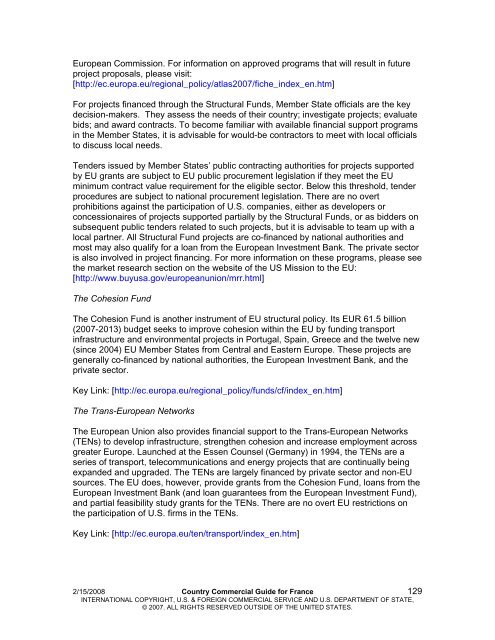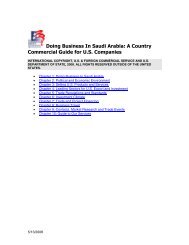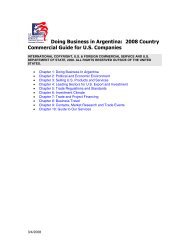Doing Business In (Insert Country Name Here) - BNA
Doing Business In (Insert Country Name Here) - BNA
Doing Business In (Insert Country Name Here) - BNA
Create successful ePaper yourself
Turn your PDF publications into a flip-book with our unique Google optimized e-Paper software.
European Commission. For information on approved programs that will result in future<br />
project proposals, please visit:<br />
[http://ec.europa.eu/regional_policy/atlas2007/fiche_index_en.htm]<br />
For projects financed through the Structural Funds, Member State officials are the key<br />
decision-makers. They assess the needs of their country; investigate projects; evaluate<br />
bids; and award contracts. To become familiar with available financial support programs<br />
in the Member States, it is advisable for would-be contractors to meet with local officials<br />
to discuss local needs.<br />
Tenders issued by Member States’ public contracting authorities for projects supported<br />
by EU grants are subject to EU public procurement legislation if they meet the EU<br />
minimum contract value requirement for the eligible sector. Below this threshold, tender<br />
procedures are subject to national procurement legislation. There are no overt<br />
prohibitions against the participation of U.S. companies, either as developers or<br />
concessionaires of projects supported partially by the Structural Funds, or as bidders on<br />
subsequent public tenders related to such projects, but it is advisable to team up with a<br />
local partner. All Structural Fund projects are co-financed by national authorities and<br />
most may also qualify for a loan from the European <strong>In</strong>vestment Bank. The private sector<br />
is also involved in project financing. For more information on these programs, please see<br />
the market research section on the website of the US Mission to the EU:<br />
[http://www.buyusa.gov/europeanunion/mrr.html]<br />
The Cohesion Fund<br />
The Cohesion Fund is another instrument of EU structural policy. Its EUR 61.5 billion<br />
(2007-2013) budget seeks to improve cohesion within the EU by funding transport<br />
infrastructure and environmental projects in Portugal, Spain, Greece and the twelve new<br />
(since 2004) EU Member States from Central and Eastern Europe. These projects are<br />
generally co-financed by national authorities, the European <strong>In</strong>vestment Bank, and the<br />
private sector.<br />
Key Link: [http://ec.europa.eu/regional_policy/funds/cf/index_en.htm]<br />
The Trans-European Networks<br />
The European Union also provides financial support to the Trans-European Networks<br />
(TENs) to develop infrastructure, strengthen cohesion and increase employment across<br />
greater Europe. Launched at the Essen Counsel (Germany) in 1994, the TENs are a<br />
series of transport, telecommunications and energy projects that are continually being<br />
expanded and upgraded. The TENs are largely financed by private sector and non-EU<br />
sources. The EU does, however, provide grants from the Cohesion Fund, loans from the<br />
European <strong>In</strong>vestment Bank (and loan guarantees from the European <strong>In</strong>vestment Fund),<br />
and partial feasibility study grants for the TENs. There are no overt EU restrictions on<br />
the participation of U.S. firms in the TENs.<br />
Key Link: [http://ec.europa.eu/ten/transport/index_en.htm]<br />
2/15/2008 <strong>Country</strong> Commercial Guide for France 129<br />
INTERNATIONAL COPYRIGHT, U.S. & FOREIGN COMMERCIAL SERVICE AND U.S. DEPARTMENT OF STATE,<br />
© 2007. ALL RIGHTS RESERVED OUTSIDE OF THE UNITED STATES.












